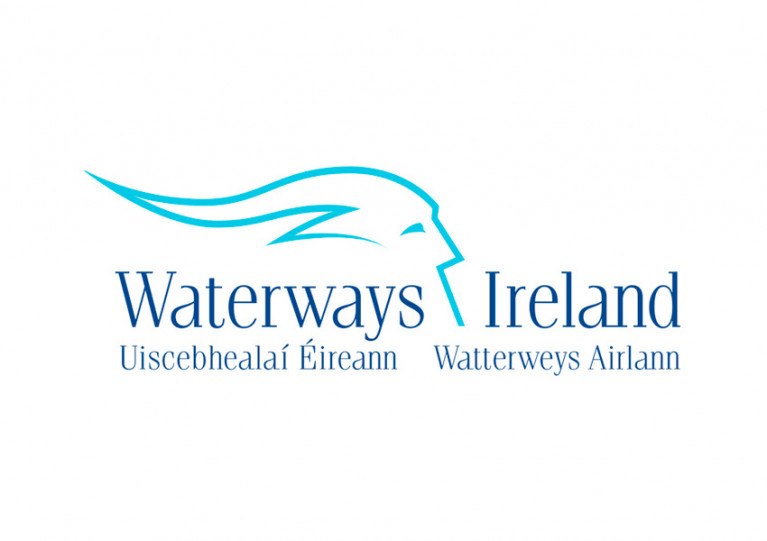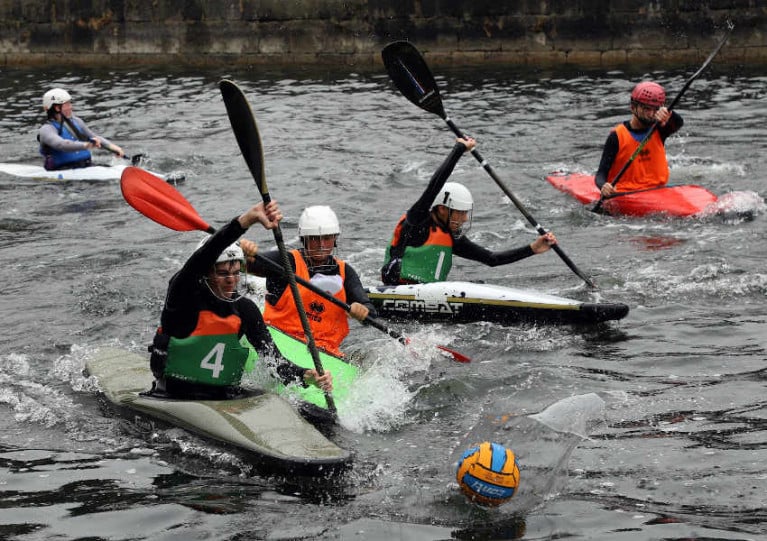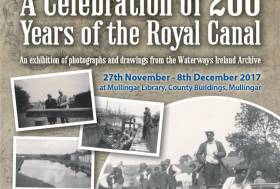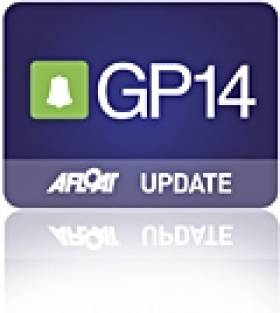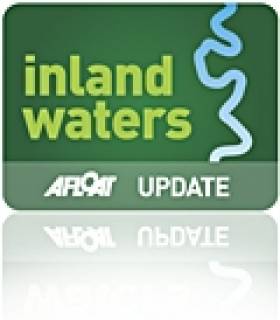Displaying items by tag: Mullingar
Towpath Maintenance on Royal Canal’s Lough Owel Feeder
Waterways Ireland notifies towpath users that sections of the towpath on the Lough Owel feeder of the Royal Canal from Mullingar Harbour to Fish Farm at Cullion will be closed periodically from today, Monday 8 February, until Friday 19 February for essential maintenance works.
Boat Restrictions For Canoe Polo Events On Royal Canal In Mullingar
Waterways Ireland advises all masters and users of the Royal Canal that canoe polo events will take place in the vicinity of the harbour in Mullingar this weekend, 27-28 September and the following Sunday, 4 October.
Boat movements in the area will be restricted on the inland waterway for the duration of the events. Masters of vessels should navigate the area with caution and comply with guidance from marshals.
Further information may be obtained from Mullingar Harbour Canoe Polo at 086 244 62 20.
Waterways Ireland Archive Exhibition in Mullingar Celebrates 200 Years of the Royal Canal
#RoyalCanal - A forthcoming exhibition in Mullingar Library will celebrate 200 years of the Royal Canal through images and drawings from the Waterways Ireland archive.
Featuring a selection of images from the archive and from the Ruth Delany and Ian Bath Collections, the exhibition reveals the fascinating history of the Royal Canal over the past 200 years.
The photographs on display are a snapshot of the long history of the inland waterway but they are also testament to the work and efforts of individuals like Ruth Delany and Ian Bath to personally document its deterioration from the 1970s onwards and to highlight an awareness of the canal during the years of lobbying for support for its restoration.
The exhibition will be on display in Mullingar Library from next Monday 27 November to Friday 8 December during library opening hours:
Monday 10am to 5:30pm
Tuesday 10am to 8pm
Wednesday 11am to 5.30pm
Thursday 10am to 8pm
Friday 10am to 5pm
Saturday 10am to 1.30pm
#gp14 – The GP14 Leinster's hosted by Mullingar SC on lovely Lough Owel in Co. Westmeath had a great entry of 36 boats from 15 clubs, from Moville in Donegal to Youghal in Cork writes Norman Lee. The tide was in so parking spots were at a premium on Saturday morning when we all rocked up but that meant deeper water for sailing thanks to the rain gods.
Saturday's 3 races in strong gusty winds had 3 different winners from different clubs. The first went to John/Donal Mc Guinness of Donegal the second to Shane Mc Carthy/Damian Bracken of Wicklow and the third to Niall Henry /Ossian Geraghty of Sligo. Large Olympic triangle courses mixed tough tacticle beats with fast planeing reaches and tactical runs and places changed regularly through the fleet with Bronze, Silver and Gold boats mixing it up.
Satisfied and tired after our exertions we all retired to the Park Hotel for a 5 star BBQ and to watch Leinster scrape by Ulster and witness the launch of a great new book on the history of MSC. There was a good band on too but it didn't get many takers from the tired legged sailors discussing the days fun.
Sunday dawned damp and dismal but it dried and the wind picked up as we all went afloat.
Three good light and tactical races were completed with interesting port biased starts and big shifts to catch out the unwary. 2 new winners popped up in search of the trophy, Paddy O Connor/ Colm O Flaherty of Sligo grabbed the first convincingly followed by Ger Owens/Melanie Morris of Dublin and Belfast taking the next 2 seeming to put them in contention but they and others got tripped by the black flag allowing the first race winners, the McGuinness brothers from Moville to be crowned Leinster Champions with their high 15.75 tally showing the competitive nature of the fleet.
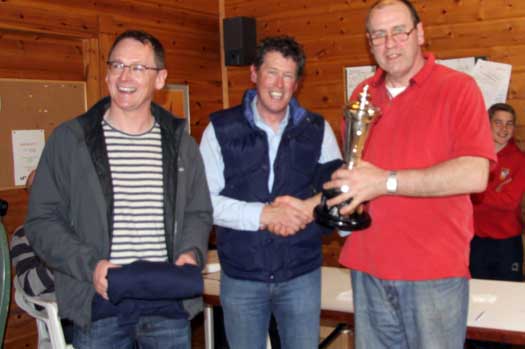
Donal (left) and John McGuinness (centre) receive their Leinster prizes from the Mullingar Sailing Club Commodore
Tough competition in the Silver fleet say Rob Lee/ Troy Dmc NAmara of Greystones in 19 yr old 13403 triumph over Simon Cully / Libby Tierney of Blessingtonin 0 yr old 14138 - they finished a creditable 7th and 11th overall.
Local man returned fro Canada Andy Van beck won the tussle for Bronze from newbies Simon/ Rebecca Jefferys of East Down and Adrian Lee Arne Edward Coyne of Youghal.
This was a great warm up for tihe Irish fleet in preparation for the Worlds in Strangford Lough in August – roll on the Ulsters in June and the Nationals in July.
Additional reportage from GP14 class:
The Leinster Championships had an early start this year but this didn't put off enthusiasm with 36 boats showing up in Mullingar to contest in the breezy conditions. At the briefing we had a minutes silence to remember Graham Elmes,a life-long sailor and a good friend of many in the fleet who very sadly passed away earlier in the week.
Beautiful sunshine with a solid force 4 gusting 5 made for very exciting sailing and Shane Mac Carthy & Damian Bracken showed their class by taking the opener followed by Sutton pair Alan Blay & David Johnston in second and Niall Henry & Ossian Geraghty in their new boat in third.
The second race was won by Niall & Ossian with the McGuinness brothers in second and Shane & Damian in third. The McGuinnesses then won the third race after a tussle up the last leg to beat Shane & Damian with Niall & Ossian in third.
Things were fairly tight after the breezy first day with the 3 boats very tight on points but Shane & Damian had a small advantage, thanks in no small part to 24 months of year round training and dieting. Keith Louden & Alan Thompson were also rumoured to be considering giving up the drink in preparation for the Worlds after watching their performance. Niall & Ossian will also have been happy to put gear failure in Swords behind them and show a real turn of pace in their new boat. As always in Mullingar there was a great social aspect with everyone back to the town and a great bar-b-que with very solid portions appreciated by all.
The following day we all awoke to rain and light winds, a complete contrast to the day before.
This was the day for Ger & Melanie to shine and we all knew it and they didn't disappoint. They had been carrying 2 fourths and a DNF from the windy day and had a lot of ground to make up. The first race had a general recall and subsequent black flag which made the start tense. Paddy O'Connor under instruction from crew Colm O'Flaherty got the favoured pin and then got a shift on the left to get away and won the race from Ger & Melanie and Keith Lauden & Alan Thompson (light wind specialists). The next race was won very easily by Ger & Melanie with Alan & David in second and Colman Grimes & David Lappin in third. Ger & Melanie cruised home in the last also with blistering speed followed again by Alan & David and with the McGuinness brothers in third and Rob Lee & Troy McNamara from the silver fleet in fourth
As we went ashore it was generally considered that Ger &Melanie had done enough as all 3 first day leaders had tripped up at various stages in the light conditions but there was a surprise in store. When the results were posted it showed a black flag DSQ for them and with the first day retiral to count, this took them out of the reckoning.
In the end the trophy went back to the sailors from Donegal in their new boat with Shane & Damian in second and Paddy & Colm in third
Rob Lee & Troy McNamara took the silver fleet with Simon Cully & Libby Tierney in second (despite very thin jib sheets) and Grahame & Rebecca Farrington in third. Andy Vanbeck honoured us with his presence from Canada and won the bronze fleet with rock star crew Nigel Sloan. Simon & Rebecca Jeffery finished second in the bronze fleet and Adrian Lee & Edward Coyne in third.
Overall Results:
Gold Fleet:
1. John & Donal McGuinness
2. Shane MacCarthy & Damian Bracken
3. Paddy O'Connor & Colm O'Flaherty
Silver Fleet:
1. Rob Lee & Troy McNamara
2. Simon Cully & Libby Tierney
3. Grahame & Rebecca Farrington
Bronze Fleet:
1. Andy VanBeck & Nigel Sloan
2. Simon & Rebecca Jeffery
3. Adrian Lee & Edward Coyne
New Doco Tells Story of Royal Canal
A new documentary on Ireland's waterways is being filmed in Mullingar this week.
The series will follow naturalist and broadcaster Dick Warner as he explores the Royal Canal in time for the final reopening of the entire route.
Warner will be taking the Rambler, an original canal tug barsg, from Dublin through to Lough Ree for the first time since 1923.
Warner told the Westmeath Examiner that he's "enjoying the wildlife side of it the most, the kingfishers and herons, the wildflowers, that's what I've loved the most about this journey. We're making very good progress. We're in Ballymahon now and we hope to reach the Shannon by towards the end of this week."
Waterways - The Final Journey is set to come to our screens in August.
The Westmeath Examiner has more on the story HERE.
Mullingar Sailing Club
History
 The club was formed on the evening of Friday 24th April 1964 at a meeting in Broder’s Hotel, now the Newbury Hotel, Mullingar in
response to a notice placed in the 'Westmeath Examiner', by
Keith Pinder, calling for a meeting of people interested in sailing.
The club was formed on the evening of Friday 24th April 1964 at a meeting in Broder’s Hotel, now the Newbury Hotel, Mullingar in
response to a notice placed in the 'Westmeath Examiner', by
Keith Pinder, calling for a meeting of people interested in sailing.
At
this inaugural meeting a committee was formed whose first task was to
find a site from which to sail. This first committee consisted of:
Commodore, Dr. G. Jackson. Hon. Secretary, Keith Pinder. Hon.
Treasurer, Ivor Fogg. Committee, Dermot Bannon, David Gibson-Brabazon,
J. O’Donnell, C. Corcoran, Mrs Farrell and Mrs. Jackson. Due to
the sudden death of Dr. Jackson later that year, Dermot Bannon was
elected as Commodore.
For the first few years, we sailed
from a field, on the shore of Lough Owel on Joe Dolan’s land at
Portloman. The GP14 was the class we
adopted having been recommended by Greg Petrie; a decision never regretted. Four members ordered boats in kit
form and built them (some of these boats are still sailing well), and having no
previous sailing experience, members taught themselves to sail over the
following few years. Organised club racing that followed helped to
improve the standard of sailing considerably.
In the time sailed from
Dolan’s we had our first regatta in 1965, actually sailed from
Dermot Bannon’s land further up the shore at Portloman. With more
space to erect the necessary marquees, etc., and for visitor access, we
hosted a number of meetings from Lough Ennell. As well as for GP14s,
classes catered for included, Shannon-One-Designs, Enterprises and Fireflies.

So that we could grow, it was
decided that we needed a site with better access and boat parking
facilities and a search for one started. The site decided upon was one
offered by Phillip Ginnell at Mullally’s where we are now and
moved there in the season of 1970. This same year we held our first
IYA, now the ISA, sail-training course using the Mirror
dinghy we had then recently adopted for junior sailing; these annual
courses are still being run today.
The site was bordered with a fence
in 1971 and since then the site has grown steadily. We have had two
clubhouses prior to our present one. The first was a
mobile home purchased in 1984; a little cramped, it got us in out of any
bad weather in which to change and meet. Unfortunately a violent storm
blew off its roof and, though it was replaced, the mobile home was
never quite the same again. An old disused army timber barrack hut
erected by club members in 1987 replaced this. It served us well for
many years until it was dismantled, removed and replaced by the
present, custom-built clubhouse officially opened in November 2004.

We have hosted a number of
important meetings. As well as the various GP14 championship and open
meetings, we have hosted the 470 class Carlsberg
Warrior Trials in 1973, a roving trial at which the Irish 470
squad was determined for the 1976 Olympic Games in Canada. Sailed in
1978 in fresh winds we hosted the Optimist Leinster championships and,
more recently, in 2004 hosted the Fireball Nationals in May of that
year. Later in September we had the GP14 Autumn Open Meeting sailed in
strong winds.
During Easter of 2006 we hosted the
Mirror Leinster championships and in October we have the GP14 Frostbite meeting: Brass monkeys need not apply!
Finally, Two members have received
public honours in recognition for services to sailing. The first was
Keith Pinder who, in 1998 received the Westmeath
All-Stars award for his services to sailing in Co. Westmeath.
The second was Kieran Milner who was awarded the ISA Volunteer
of The Year award in 2002, again for his services and
contributions to sailing. Private club honours have gone to Keith
Pinder, Ivor Fogg, David Gibson-Brabazon, Robert Heath and Garry Walshe
who were awarded honorary life memberships of the club in December 2002
for their services to the club.
The Mullingar Sailing Club has progressed from its humble
beginnings, when members had to change into and out of
sailing gear in the open air beside their cars and then, shortly after, nearly having to close due
to too few members. From this we have grown to a thriving
and popular club for both members and welcomed visitors
alike. Its enthusiastic committees and membership will ensure
that the club will continue to thrive for many years to come. Robert Heath
(Above details and images courtesy of Mullingar Sailing Club)
Mullingar Sailing Club, c/o Sean Duffy, Kitty's Hill, Tullanisky, Mullingar, Co. Westmeath. Tel: 086 822 5384, [email protected]
Have we got your club details? Click here to get involved


























